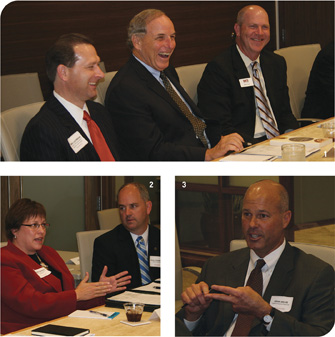
1: In a rare moment of levity, moderator Jack Cashill, center, and co-chairman Mike Lochmann, left, and Kevin Cook, responded to a lighter assessment of Dodd-Frank's impact. | 2. Karen Garrett questioned the effectiveness of a new oversight agency; Paul Thompson listened. | 3. John Dicus listed the changes that are being forced on Capitol Federal Financial.
Overview
To begin, Mike Lochmann walked his colleagues through some of the likely consequences of the reforms, just a day before the Senate signed off on them. Perhaps most relevant is the Bureau of Consumer Financial Protection, which has already been shorthanded to the acronym BCFP, a cruel psychological blow to the Brocade Certified Fabric Professionals
of the world.
The BCFP will operate within the Federal Reserve and with a very substantial budget. It will have the auth-
ority to adopt consumer-protection regulations that are applicable to all banks and covered entities and will have the power to examine large banks. Rumored to be first head of the BCFP is Elizabeth Warren, a Harvard law professor whom Lochmann described as “very liberal, very well-written on the subject of consumer protection.”
“I just cannot help but point out the irony,” said Lochmann, “that while every bank and credit union and every mortgage lender is covered, not one used car dealer is. Go figure.”
The new law also gives the Federal Reserve the power, whether the Fed wants it or not, to set rates for debit/credit interchange fees. It eliminates “trust-preferred” as a source of capital for bank holding companies. Importantly, Dodd-Frank repeals the federal pre-emption for subsidiaries, agents and affiliates of national banks and federal thrifts, and limits the authority of the Office of the Comptroller of the Currency (OCC) to pre-empt state laws.
The new law also alters the interest rate exportation authority of most institutions, while preserving it for national banks. It implements what Lochmann called a “Volcker Rule-light,” which allows banks to have some proprietary trading. It authorizes compensation rules specifically applicable to banks and their affiliates. It requires certain originators of securitized mortgage loans and others to retain a 5 percent interest, “a very big change,” said Lochmann. The one thing that bankers might like about the law, concluded Lochmann, is that it authorizes de novo branching on a nationwide basis for all banks, not just for federal thrifts.
Addressing “Too Big to Fail”
Kevin Cook asked his colleagues a question that should have been asked early on in the legislative process: “Did this bill address the too-big-to-fail problem?”
After a long silence, John Dicus, chairman and CEO of Capital Federal Bank & Trust, cut right to the chase. “The short answer is, no,” he said bluntly. As he observed none of the parties most responsible for the financial mess—the big banks, Freddie Mac and Fannie Mae, or the mortgage brokers—were significantly restrained by this, if they were affected at all.
Tom Jackson, president of Metcalf Bank, added the minor corrective that mortgage brokers that are securitizing their loans need to retain a certain percentage of the securitization on the books, “which does give them that skin in the game.” But, as Dicus countered, the bill worked in certain escape clauses that allow the brokers to finesse their way out.
As Stinson partner Karen Garrett observed, part of the systemic risk issue that everyone recognized is that there was no single agency that had a perspective on the entire financial system. One of the things the bill has tried to do is create a new oversight entity that would take on some of that overall burden. “But I think there’s real question about what they ended up with,” said Garrett, “whether it will have the ability to actually do anything about it.”
“The concept of too big to fail is just that,” said Steve Fleischaker, Olathe market president of the Bank of Blue Valley. “Those institutions aren’t going to live in any fear of the new regulation because they feel they’re too big to be taken over by the government.”